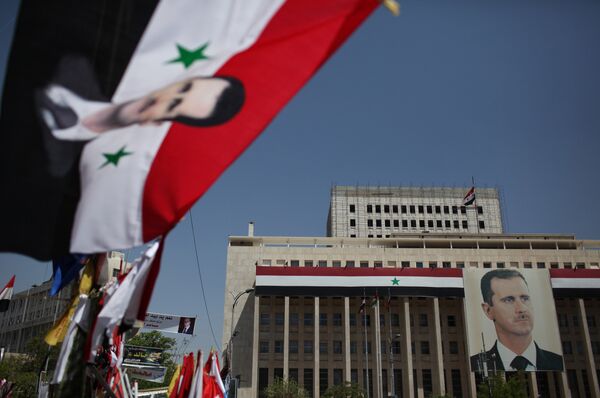As Russia faces growing international pressure over its alleged support for the embattled regime in Syria, the Kremlin’s stance on the crisis in the Middle East country has remained a virtual non-topic at home, with both anti-Putin protest leaders and independent media largely silent on the issue.
That’s not to say, though, that the leaders of recent mass protests against the 12-year-old rule of President Vladimir Putin are indifferent to the ongoing bloodshed in Syria and continuing Russian arms deliveries to Damascus.
“This is an absolutely short-sighted policy that will see Russia lose whatever influence it still has in the Middle East,” said Boris Nemtsov, Solidarity party leader and deputy prime minister under ex-President Boris Yeltsin.
”Putin is backing [Syrian President Bashar] Assad because he thinks he could be next,” Nemtsov told RIA Novosti. “He also sees it as a part of his battle with the United States, his long-time obsession.”
Fellow protest leader Yevgenia Chirikova was even more scathing on Putin’s policies on Syria – Russia’s sole remaining ally in the Arab world.
“I don’t have words to describe how wrong it is to sell arms to a dictator who shoots at his own people,” she said. “It’s also strange to hear the Kremlin say the Syrian people should decide their own destiny, when they don’t pay any attention at all to the wishes of the Russian people.”
Russia – along with China – has twice vetoed United Nations resolutions against Syria over what it says is a pro-rebel bias. Putin has also made it clear that the Kremlin will not sanction UN military intervention to stop what Western powers say is the brutal suppression of the now 15-month uprising against Assad.
But Foreign Minister Sergei Lavrov said again on Wednesday that Russia had no special interest in seeing Assad remain in power. He also said that continuing weapons deliveries to Syria were of an “exclusively” defensive nature.
But Amnesty International slammed on Thursday Russia’s stance on the crisis, saying the Kremlin “bears a heavy responsibility for allowing the brutal crackdown on legitimate dissent in Syria to continue unchecked.”
Putin’s opponents looked unlikely however to use the criticism by the human rights organization as a stick with which to beat their arch-nemesis.
Ilya Yashin, a high-profile opposition figurehead who recently served ten days behind bars for protest-related offences, told RIA that while he was critical of Kremlin policy’s on Syria, he was wary about raising the issue.
“Personally, I think it’s a crime to sell arms to Assad. But I cannot speak for the entire opposition,” he said. “We are concentrating on domestic Russian politics, on the things that unite us all, rather than the things that we could quarrel over.”
“I realize, of course, that this is a very serious issue, but we have to concentrate on Russia, because there is a danger that things here could go the same way as in Syria,” he added.
And analyst Maria Lipman at the Moscow-based Carnegie Center think-tank suggested the anti-Putin protest leaders were perhaps reluctant to raise the issue of Syria for fear of alienating supporters.
“People in Russia don’t have such feelings that the country should side with the United States,” she said. “There is a lot of resentment in Russia about American policies. Going to an anti-Putin protest does not mean at all that you support the United States.”
“Anti-Putin rhetoric is what unites very diverse ideological groups,” she added. “To raise the issue of Syria would only emphasize this diversity.”
A significant proportion of the anti-Putin movement is made up of left-wing and hard-line Communist groups, all of whom are virulently opposed to what they see as an unacceptable U.S. hegemony in world affairs.
And veteran Communist leader Gennady Zyuganov, who finished a distant second to Putin at this year’s presidential polls, has more than toed the Kremlin line on Syria, accusing “Western special forces” of being behind last month’s massacre in the Syrian village of Houla.
The ongoing rallies against Putin have also seen the involvement of a number of nationalist and ultra-right groups.
Nationalist leader Vladimir Tor refrained from outright criticism of Kremlin policies on Syria, saying simply: “The fewer weapons there are in the Middle East, the better.”
But he also hit out at U.S. policies in the Middle East.
“If it is bad to sell arms to Syria, then it is also bad to sell arms to Israel. If it is bad for Iran to have a nuclear weapon, then it is bad for Israel to have one,” he told RIA. “This is an example of double standards.”
Russia’s opposition media, usually quick off the mark to criticize Putin, has also so far failed to address the Syria issue.
“This theme is, of course, interesting for our readers,” said Vitaly Yaroshevsky, deputy editor of the liberal Novaya Gazeta newspaper. “And we plan to cover the topic soon.”
He cited organizational difficulties for the failure of the paper, funded by former Soviet leader Mikhail Gorbachev and tycoon Alexander Lebedev, to focus on the Syria crisis.
“[But] our position is that there is no call to praise the Russian authorities over this,” he went on, adding that his own personal opinion was that the “international community can not turn a blind eye to the murder of peaceful civilians.”
Analyst Alexander Shumilin of Moscow’s Center for the Greater Middle East Conflicts told RIA after the killings in Houla that the vast majority of people in Russia had been convinced by state media that “terrorists” were to blame for such atrocities.
“Most people in Russia believe what state television tells them, that the massacre in Houla was carried out by terrorists and the West is trying to blame it all on Assad,” he said.




